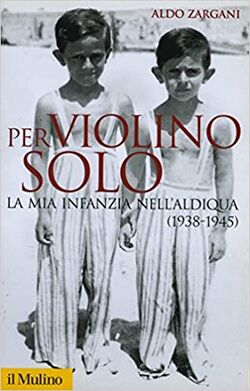Aldo Zargani (M / Italy, 1933), Holocaust survivor
Aldo Zargani (M / Italy, 1933), Holocaust survivor.
- KEYWORDS : <Hidden Children>
- MEMOIRS : For Solo Violino (1995; ET 2002)
Biography
Aldo Zargani was born in 1933 in Turin, Italy. For many years, he worked for RAI, the Italian broadcasting network. Per Violino Solo was first published in Italy in 1995 and won several literary awards, among them the Premio Acqui Storia and the Premio Ishia. Zargani now lives and writes in Rome.
Book : For Solo Violino (1995; ET 2002)
- Aldo Zargani, Per violino solo: La mia infanzia nell'Aldiqua, 1938-1945 ( ). English ed. For Solo Violin: A Jewish Childhood in Fascist Italy (2002).
"Per un ebreo italiano classe 1933 come Aldo Zargani il periodo che va dal varo delle leggi razziali fasciste nel 1938 al 1945 ha inevitabilmente un carattere duplice: sono gli anni della persecuzione e della paura ma anche gli anni favolosi dell’infanzia, anni fatali e fatati. In questo libro Zargani ripercorre le traversie sue e della sua famiglia in quei “sette anni di guai”: la perdita del lavoro del padre violinista, l’esclusione dalle scuole, l’espatrio fallito, la fuga da Torino attraverso il Piemonte, l’arresto dei genitori, il collegio, la deportazione dei parenti; ma se quell’esperienza si incide nella carne del bambino come una ferita immedicabile, la memoria che la rivisita sa tuttavia estrarne anche quella galleria di personaggi e situazioni comiche o grottesche che comunque abita l’infanzia, donde l’impasto impossibile di un “amarcord” ilare e luttuoso, di un “giornalino di Giamburrasca” che racconta una storia di spavento e dolore. Una prova di virtuosismo narrativo, certo, ma anche un modo vitale per liberarsi del peso di quell’esperienza e di trasmetterne la lemoria: magari, da nonno a nipote, come una favola un po’ divertente e un po’ paurosa."
"In an extraordinary literary debut, Aldo Zargani reconstructs the lost world of his Jewish childhood during the perilous years 1938–45 when he and his family fled from Fascists and Nazis in northern Italy. His haunting memoir acquires a cinematic intensity as he crosscuts from the blood-red stone spires of Basel, where his father failed to find refuge for his family in 1939, to fiery scenes of the Allied bombing of Turin in 1942, to the freezing winter of 1943–44, which Zargani and his brother spent hidden in a Catholic boarding school deep in the countryside.
For Solo Violin is filled with colorful portraits of Italian aristocrats and peasants, priests and soldiers, teachers and students, informers and partisans. At its heart is Zargani's vivid depiction of his father, a concert violinist forced to give up his career when the Fascists came to power. In this time of persecution, the Zargani family survived through their own resourcefulness and through the efforts of the many Italians who came to their aid, from the young doctor who helped them escape from Turin to the shepherd who supplied them with milk during the last year of the war, when they lived among the partisans in a remote Piedmont valley.
Looking back over a distance of fifty years, Zargani rediscovers the enchantment of childhood shining in "fable-like constellations" even amidst the inferno of war. Lullabies and school games, fairy tales and family jokes are interwoven with the events of terror and oppression. Lyrical, humorous, tender, and wise, For Solo Violin is a testament to resilience and hope during the darkest period in human history.
"A broad panorama of Italian-Jewish history in [the last] century. Elegant in its style and, however tragic, also rich with understatement, irony, and wit, For Solo Violin counts among the great, enduring works of art."—Focus Magazine, Germany
"A tragic, deeply engaging, delicious book—yes delicious, too. (Reading it makes you smile.) It's a miracle…It makes one think of the wit of Kafka!"—L'Espresso, Italy
"Zargani depicts a wealth of sad, despairing, but often also incredibly funny episodes…But vibrating along with the humor is always the sense of threat, and behind it opens the abyss of terror."—Neue Zürcher Zeitung, Switzerland
